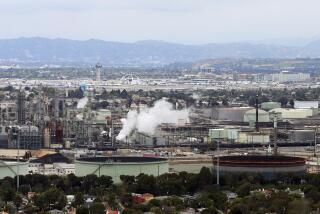Group seeks better deal on San Onofre closure
The San Francisco consumer group that helped broker the $4.7-billion deal dividing costs for the shutdown of the San Onofre nuclear plant said Wednesday that it no longer supports the agreement and called on regulators to reopen talks.
In a five-page motion submitted to the California Public Utilities Commission, the Utility Reform Network said recent revelations of back channel communications between regulators and utility executives forced the organization to rethink its position.
The group hopes for a better deal for Southern California Edison and San Diego Gas & Electric Co. ratepayers who were assigned to cover $3.3 billion of the shutdown costs, or 70%, even though Edison installed the faulty replacement steam generators that caused the January 2012 shutdown.
The filing is a major turnaround for TURN. The nonprofit defended the San Onofre deal for months, even as evidence mounted that the agreement was hatched during a secret 2013 meeting in Warsaw, Poland, between former commission President Michael Peevey and an Edison executive.
Notes jotted down at the meeting have become part of state and federal criminal investigations into possible favoritism of utility executives by the regulators entrusted to oversee them.
“TURN agrees that recent disclosures detailing extensive communications between SCE and CPUC decision-makers during the pendency of this proceeding are very troubling,” the filing states. “TURN was a good faith participant in the settlement negotiations, and was not aware of the Warsaw note, the private meeting, or any agreement between Mr. Peevey and SCE at any time before or during the extended settlement negotiations that led to the proposed settlement.”
The commission did not respond to questions Wednesday. Edison issued a statement saying it is disappointed in the TURN decision.
“The settlement it negotiated with consumer groups is fair and reasonable, was properly negotiated and is in the public interest,” Edison spokeswoman Maureen Brown said.
Lawmakers and other consumer groups have embraced the idea of reopening debate over how to resolve shutdown costs for San Onofre.
In April, Sen. Ben Hueso called for the San Onofre deal to be reconsidered, saying it was improperly lopsided in favor of utilities over ratepayers.
“I do not think the settlement should stand,” said Hueso, a San Diego Democrat who chairs the Senate Committee on Energy, Utilities and Communications. “The process by which the settlement was developed — previously undisclosed private meetings half a world away — clearly is troubling.”
Two days later, the commission’s Office of Ratepayer Advocates — another party to the settlement — said ratepayers should get $648 million more from Edison and minority plant owner San Diego Gas & Electric. The office stopped short of saying the agreement should be reopened.
The office’s acting director, Joseph Como, stood by that recommendation Wednesday, saying he is worried that scrapping the settlement could lead to an outcome even less favorable to utility customers.
“If it gets opened up, I don’t think ratepayers are going to fare any better,” he said. “But I do think Edison should be punished, so I’m going to renew my call for the $648-million penalty. It should be a refund to the ratepayers.”
Assemblyman Anthony Rendon (D-Lakewood), who chairs the lower house’s Committee on Utilities and Commerce, said TURN’s changed stance is significant. “One of the settling parties seeing the light on the San Onofre case is a strong statement about the questionable manner the settlement was negotiated,” Rendon said. “A more open and transparent resolution to the settlement would be a healthy step toward the PUC regaining public confidence in its operations.”
Other consumer advocates were grateful that TURN changed its mind.
Edison’s “one-sided access to CPUC decision-makers and refusal to make legally required disclosures poisoned the resulting settlement,” said John Geesman, an attorney for the Alliance for Nuclear Responsibility. “Now the commission needs to decide what to do with this stinking mess.”
The dispute dates from January 2012, when flawed replacement steam generators at the San Onofre Nuclear Generating Station leaked radiation and forced the plant to shut down.
It never produced another spark of electricity. Edison announced in June 2013 that the plant would be closed for good. That announcement came a little more than two months after Peevey and former Edison executive Stephen Pickett met secretly at the luxury Hotel Bristol Warsaw to discuss the shutdown.
The two men hashed out deal points on hotel stationery, meeting notes that were seized during a search of Peevey’s Los Angeles area home in late January.
The terms listed on the two pages of “RSG notes” are largely similar to the agreement reached between TURN and Edison, which began discussing a settlement in June 2013.
Edison disclosed the Warsaw meeting in February of this year. The utility said new information prompted executives to realize the meeting should have been reported nearly two years earlier.
In its filing Wednesday, TURN complained that Edison withheld key information during settlement negotiations, mainly that the utility already reached a settlement framework with the commission president before its discussions began.
Commissioners are supposed to make decisions based on the public record, and “ex parte” communications that could prejudice their decision-making are supposed to be disclosed within three days, not years later. The agency received a report on its practices this week from an outside law firm, which found widespread rule violations are common and private executives are routinely favored over the public interest.






